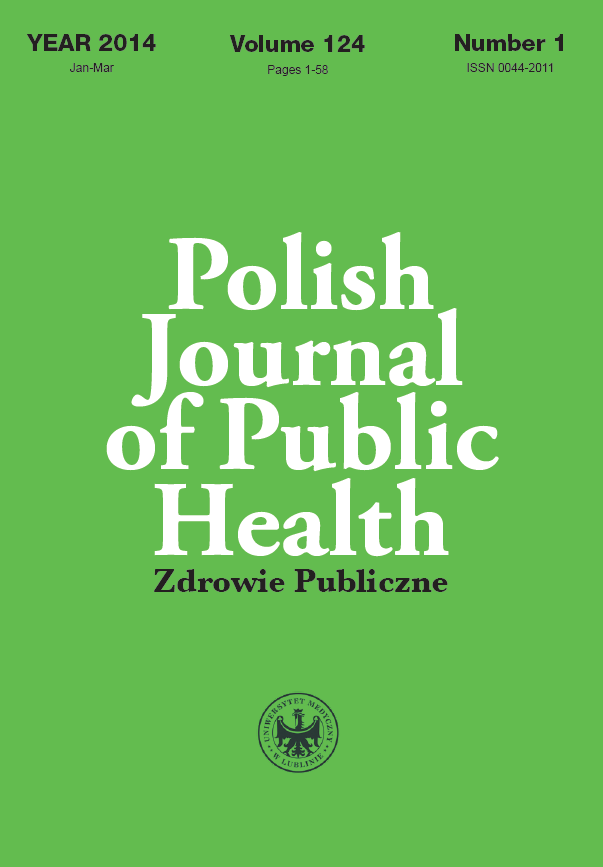Assessment of medical personnel knowledge about the function of transplant coordinator with reference to current Polish legislation
DOI:
https://doi.org/10.2478/pjph-2014-0003Keywords:
transplant coordinator, transplantation, law, knowledge, nurses, physiciansAbstract
Introduction. Initially, a transplant coordinator assisted in the process of removal and transplantation of organs. The most important rule in the Polish legislation is the Act of July 17th, 2009, amending the Act on removal, preservation, and transplantation of cells, tissues, and organs. Professional qualifications of a transplant coordinator are specified by the Regulation of the Minister of Health of December 4th, 2009 on detailed conditions of removal, preservation, and transplantation of cells, tissues, and organs.
Aim. The study aimed to assess the knowledge of medical personnel about the function of a transplant coordinator with reference to the current Polish legislation.
Material and methods. The study was conducted in April 2013 among 100 selected health professionals (25 physicians, 62 nurses, and 13 persons representing other medical professions) with the use of a questionnaire comprising 42 close-ended simple choice questions and one multiple-choice question. They were referring to various aspects associated with the legal axiology of transplantation, procedure of organ donation, and tasks of a donation coordinator, as well as one open-ended question about the age of respondents.
Results. Statistically significant differences between the occupational groups were found in relation to questions about legal and medical aspects. As many as 21 nurses (34%), 26 physicians (92%), and 6 persons representing other medical professions (46%) (p<0.000) provided the correct answer to a question referring to determination of death, and 19 nurses (31%), 7 physicians (28%), and 5 persons representing other medical professions (p<0.021) answered correctly to a question about the key premise to determine brain death.
Conclusions. 1. The knowledge of medical personnel about the function of a transplant coordinator and the legal provisions concerning brain death determination needs to be supplemented. 2. There is a need of constantly supplementing knowledge of medical personnel about the clinical aspects of transplantation.
References
1. Matych J, Skrzypek-Mikulska A. Prawne zagadnienia transplantacji narządów – część I. Urologia – nauka i praktyka. 2009;10/3(55):16-8.
2. Ustawa z dnia 17 lipca 2009 r. o zmianie ustawy o pobieraniu, przechowywaniu i przeszczepianiu komórek tkanek i narządów oraz o zmianie ustawy. Przepisy wprowadzające Kodeks karny (Dz. U. 09.141.1149 z dnia 31 sierpnia 2009 r.z późn. zm.).
3. Rozporządzenie Ministra Zdrowia z dnia 4 grudnia 2009 r. w sprawie szczegółowych warunków pobierania, przechowywania i przeszczepiania komórek tkanek i narządów (Dz. U. z dnia 16 grudnia 2009 r.).
4. Rowiński W, Jakubowska-Winecka A, Czerwiński J. Koordynator transplantacyjny. Polska Unia Medycyny Transplantacyjnej. [http://www.uniatransplantacyjna.pl]
5. Special Eurobarometer 33a/ Wave 72/3 – TNS Opinion Social, Organ Donation & Transplantation, 2010. [http://ec.europa.eu.publik_opinion/archiwes]
6. Feliksiak M. Stosunek do przeszczepiania narządów. Komunikat z badań CBOS/BS/146/2009. Warszawa; październik 2009. [http://cbos.pl]
7. Kośmider-Cichomska A. Postawy wobec przeszczepu narządów. Raport z badań. IPSOS. Warszawa; 2002.[http://Ipsos.pl]
8. Gorzkowicz B. Opinia na temat dawstwa narządów wśród studentów uczelni wyższych Szczecina. Probl Pielęg. 2010;18(2):111-6.
9. Makara-Studzińska M, Kowalska AJ, Jakubowska K. Poziom wiedzy oraz opinie pielęgniarek na temat transplantacji organów. Med Og Nauk Zdr. 2012;18(1):31-6.
10. Makara-Studzińska M, Celiński R. Poziom wiedzy pielęgniarek na temat medycyny transplantacyjnej. Zdr Publ. 2009;119(4):408-13.


